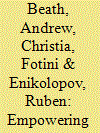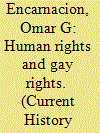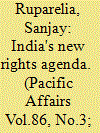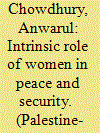|
|
|
Sort Order |
|
|
|
Items / Page
|
|
|
|
|
|
|
| Srl | Item |
| 1 |
ID:
127807


|
|
|
|
|
| Publication |
2013.
|
| Summary/Abstract |
In societies with widespread gender discrimination, development programs with gender quotas are considered a way to improve women's economic, political, and social status. Using a randomized field experiment across 500 Afghan villages, we examine the effects of a development program that mandates female participation. We find that even in a highly conservative context like Afghanistan, such initiatives improve outcomes specific to female participation in some economic, social, and political activities, including increased mobility and income generation. They, however, produce no change in more entrenched female roles linked to family decision-making or in attitudes toward the general role of women in society.
|
|
|
|
|
|
|
|
|
|
|
|
|
|
|
|
| 2 |
ID:
127588


|
|
|
|
|
| Publication |
2014.
|
| Summary/Abstract |
When, many years from now, historians undertake to determine the watershed moments in the evolution of the international human rights movement, they likely will single out for attention the June 2011 United Nations Human Rights Council (UNHRC) resolution affirming that "gay rights are human rights." A simple fact underscores the resolution's momentousness: It has become common to think of gay rights and human rights as closely intertwined, yet the 1948 Universal Declaration of Human Rights-which asserted that human rights are inalienable rights that a person is entitled to simply because he or she is a human-made no mention of sexual identity, even as it addressed a wide range of rights, such as the right to work, housing, education, association, religion, and even leisure. So how did this commingling of human rights and gay rights come about, and what does it say about the future of both movements?
|
|
|
|
|
|
|
|
|
|
|
|
|
|
|
|
| 3 |
ID:
129475


|
|
|
|
|
| Publication |
2013.
|
| Summary/Abstract |
Community development in the border areas of Indonesia have not received sufficient government attention, despite being a strategic area and a reflection of a country's front line. The focus of this article is the National Community Empowerment Program in the rural border area of West Borneo Previous studies have indicated various impacts to the border area welfare, such as the rise of unemployment within communities, difficulty in gaining access to food sources, increase in the consumptive nature of the people, heightening of criminal cases, decrease of the quality of environment, and the rising presence of patrons and clients. If this issue is left unresolved, the community will surely face increasingly complex conditions.
|
|
|
|
|
|
|
|
|
|
|
|
|
|
|
|
| 4 |
ID:
128534


|
|
|
|
|
| Publication |
2013.
|
| Summary/Abstract |
Since 2004, India has introduced a series of progressive national bills that enact a right to new civic entitlements, ranging from information, work and education to forest conservation, food and basic public services. What explains the emergence of these laws? How are the rights conceived by these acts conceptualized, operationalized and pursued? What are the promises, challenges and risks-legal, political and economic-of enshrining socioeconomic entitlements as formal statutory rights? This paper engages these questions. In part 1, I argue that three slow-burning processes since the 1980s, distinct yet related, catalyzed India's new rights agenda: high socio-legal activism, rapid uneven development and the expanding popular foundations of its federal parliamentary democracy. Significantly, all three processes exposed the growing nexus between political corruption and socioeconomic inequality. Equally, however, each raised popular expectations for greater social justice that were only partly met. Part 2 of the paper evaluates India's new rights agenda. The promise of these new laws is threefold: they breach the traditional division of civil, political and socioeconomic rights, devise innovative governance mechanisms that enable citizens to see the state and provide fresh incentives for new political coalitions to emerge across state and society. Several risks exist, however. Official political resistance from above and below, the limited capacities of judicial actors, state bureaucracies and social forces and the relatively narrow base of many of these new movements endanger the potential of these reforms. The paper concludes by considering several imperatives that India's evolving rights movement must confront to realize its ambition.
|
|
|
|
|
|
|
|
|
|
|
|
|
|
|
|
| 5 |
ID:
130484


|
|
|
|
|
| Publication |
2014.
|
| Summary/Abstract |
International Women's Day in 2000 was an extraordinary day for me, and will remain so for the rest of my life. That day, I had the honor of issuing on behalf of the United Nations Security Council in my capacity as its president a statement that formally brought to global attention the unrecognized, underutilized and undervalued contribution women have been making towards the prevention of wars, peace-building and engaging individuals and societies to live in harmony. The members of the Security Council recognized that peace is inextricably linked with equality between women and men, and affirmed the equal access and full participation of women in power structures and their full involvement in all efforts for peace and security.
|
|
|
|
|
|
|
|
|
|
|
|
|
|
|
|
| 6 |
ID:
130488


|
|
|
|
|
| Publication |
2014.
|
| Summary/Abstract |
For advocates of United Nations Security Council Resolution 1325 on women, peace and security, the 10th anniversary of the resolution in October 2010 2011was no longer an occasion to sing praises to the resolution. We all know that UNSCR 1325 is important. We all know that it is groundbreaking and game-changing. We have heard all of that from the UN, from member states and even from our fellow civil society actors year in and year out in the last 10 years.
What many of us have decided to do was to take stock of where the world is in terms of the actual implementation of the resolution and the push for real commitments and concrete actions - commitments that would not be long on promise but short on implementation. So where are we in terms of actual implementation 10 years on? Members and partners of the Global Network of Women Peacebuilders (GNWP) conducted in-country monitoring of UNSCR 1325's implementation in Afghanistan, Burundi, Canada, the Democratic Republic of Congo, Fiji, Nepal, the Netherlands, the Philippines, Rwanda, Sierra Leone and Uganda, using a set of common indicators they selected and developed.
|
|
|
|
|
|
|
|
|
|
|
|
|
|
|
|
| 7 |
ID:
142323


|
|
|
| 8 |
ID:
127649


|
|
|
|
|
| Publication |
2014.
|
| Summary/Abstract |
Development is conventionally understood in various ways including economic growth, increase of gross domestic product (GDP), rise of per-capita income, improvement of social facilities, political stabilities, and women's empowerment and many other issues, but it finally means bringing positive changes in the life of people. However, development is always contextual because the notion and nature of development often varies from society to society depending on the context of local-societal dynamics. Therefore what is regarded globally accepted model of development can be challenged by the local discourse of development, since local-level perception could contest the universal model. This article addresses such a case of development which is conceptualised from the social and cultural point of view amid everyday experiences of ordinary people's lives. The article contextualises its argument with specific reference to the Khumi people living in the Chittagong Hill Tracts of Bangladesh.
|
|
|
|
|
|
|
|
|
|
|
|
|
|
|
|
| 9 |
ID:
179774


|
|
|
|
|
| Summary/Abstract |
This is a study of a group of Hong Kong social workers who have worked in mainland China for the past decade building a social work profession. In an unfamiliar environment full of uncertainties and obstacles, the interactions of these overseas professionals with local state and societal actors have effected change in the transmission of knowledge and techniques across borders, forging of local alliances to initiate change, adaptation of professional practices to local contexts, and contestation of encroachments on their professional autonomy, ethics, and standards. In their endeavours to introduce novel knowledge and practices into the mainland, these social workers have actively engaged with state agents and inspired indigenous societal actors, attempting to turn them into ‘rooted cosmopolitans’ and to create opportunities and platforms for state-in-society rather than state-versus-society scenarios.
|
|
|
|
|
|
|
|
|
|
|
|
|
|
|
|
|
|
|
|
|